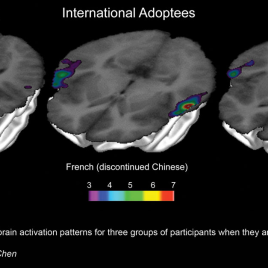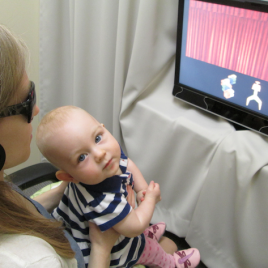Researchers have mapped out how meanings of words are represented in the human brain. Researchers collected MRI data from seven participants while they listened to over 2 hours of stories on a radio show called The Moth Radio Hour. They found that information about the meaning of language is distributed broadly across over 100 distinct […]
Tag: language
Shared semantic structure between human languages
Human languages share a common semantic structure regardless of the regional environment in which a language evolved, according a study of 81 languages. The authors believe concepts expressed in language may arise from universal properties of human cognition. Examining how words are related to other words in a language revealed a universal semantic network. For […]
Language changes brain patterns
Very early language experience will influence how a child’s brain processes a new language later in life, according to a study in Nature. Researchers examined three groups of children, all of whom were fluent in French. One group had no exposure to Mandarin, another was fluent in Mandarin, and the last third group had been […]
This is your brain on Whistled Turkish
While language is thought to be primarily a function of the brain’s left hemisphere, new research shows, it isn’t necessarily so. Whistled Turkish, a form of Turkish adapted into a series of whistles to allow for communication over greater distances, is processed equally in both brain hemispheres, researchers have found. Whistled Turkish is the only […]
Language evolves faster in isolated populations
Changes in genetics and language follow similar patterns as human population disperse, however language is able to spontaneously change in isolated populations. Both genetics and language change over time as small mutations in genes or phonemes, like the ‘k’ sound in ‘cat’ or ‘skill’, accumulate or are lost. Additionally both language and genetics change by […]

Mapping unconcious memories of a lost language
A new study shows that our brains light up when we hear a language we once knew, even if we no longer understand it. The study used functional magnetic resonance imaging (fMRI) to study the brains of three groups of children: those who spoke only French, those who were bilingual in French and Chinese, and […]

Children tune into their parents, regardless of language
Monolingual children and bilingual children are equally good at learning new words, as long as they hear them from people who comes from their own language environment, a new study shows. Researchers tested thirty 17-month-old French-English bilinguals’ infants and thirty-one English monolinguals’ infants learning two simple pair of syllables (‘kem’ and ‘gem’) produced by an […]
